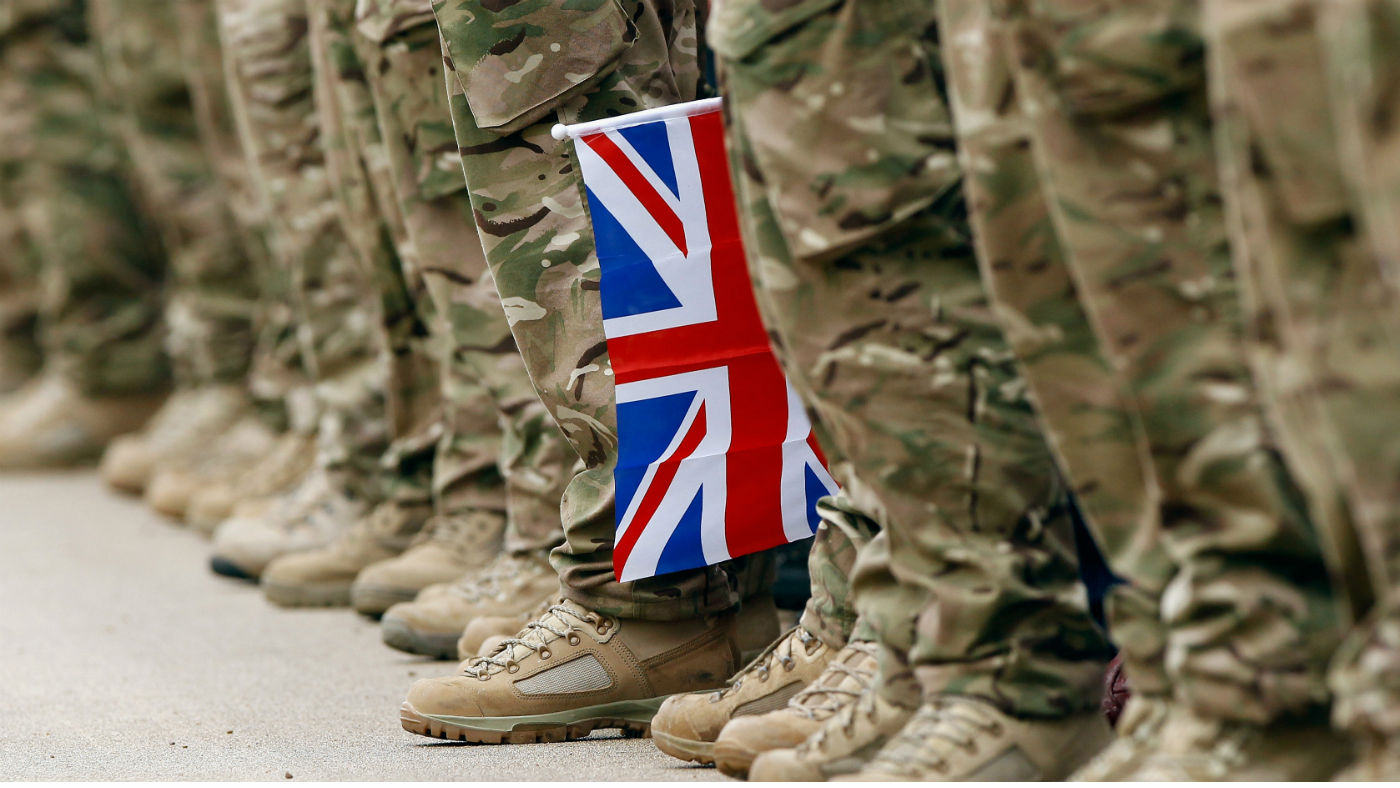What the Army can legally do to tackle riots after Brexit
The military steps into the role of law enforcement more regularly than some might think

A free daily email with the biggest news stories of the day – and the best features from TheWeek.com
You are now subscribed
Your newsletter sign-up was successful
The prospect of a no-deal Brexit has led to some dystopian predictions about what might happen if the UK leaves the EU without a transition plan in place on 29 March.
Councils in Kent warned of impending gridlock on the roads and supermarkets of a disruption to food supplies and possible price rises. Several newspapers with differing stances on Brexit reported on the potential for military deployment to help maintain public order.
Whether this is rooted in genuine concern or political alarmism, it’s true that the military can legally be called in to help in certain circumstances. And at times of crisis, it’s common for some to call for military deployment. It happened during the English riots in 2011, and has been a regular feature during prison riots ever since the 25-day riots at Strangeways prison in 1990. In the worst prison riots in Scotland in 1987, special forces unit the SAS was eventually sent in.
The Week
Escape your echo chamber. Get the facts behind the news, plus analysis from multiple perspectives.

Sign up for The Week's Free Newsletters
From our morning news briefing to a weekly Good News Newsletter, get the best of The Week delivered directly to your inbox.
From our morning news briefing to a weekly Good News Newsletter, get the best of The Week delivered directly to your inbox.
Contingency plans where the military will step into the role of law enforcement – either in the guise of police or prison officers – happens more regularly than some people seem to think. It’s often part of standard preparations for a worst-case scenario.
First, call for more police
In an ideal world, contingency plans provide the police with a set of clear instructions that provide a multi-agency response to events such as man-made disasters, infrastructure failure, terrorism and riots. But since 2010, successive Conservative governments have pursued a policy of austerity within the public sector which removed more than 30% from policing budgets, leading to drastic reductions in the number of police officers across England and Wales. This will limit what plans police forces can put in place to manage any public disorder.
The main way to manage shortages in policing is via the use of what is termed “mutual aid”, where one force can request public order support from another force anywhere across England and Wales. Such mutual aid can be requested either in advance, which is often done for the policing of large-scale public events such as football matches, or at short notice during an emergency. The officers are then seconded to the force that has requested their presence and can exercise all of the powers of a constable of that force without jurisdictional issues arising.
A free daily email with the biggest news stories of the day – and the best features from TheWeek.com
Such borrowing of officers is based on the assumption that public order incidents are localised and only need a minor increase in manpower to be contained. It’s conceivable that should no-deal Brexit lead to large-scale disruption to food supplies and essential services then public order incidents could happen in numerous locations. With police office numbers already stretched to breaking point, the required manpower would inevitably have to come from elsewhere. This is where the military could step in.
Legal grey area
The government policy that regulates military help is called Military Aid to the Civil Authorities (MACA), governed in law by the Civil Contingencies Act 2004. MACA is broken down into three broad areas, each of which has its own specific governing principles and legislation. The one that would have most relevance in the case of Brexit is “military aid to the civil power”, which provides armed, emergency support to the state to help maintain law, order and public safety.
The law gives the government the legal right to ask the military to provide aid to civil authorities should the need arise. This aid can take the form of niche capabilities – such as when army Green Goddess fire engines were called in during strikes by firefighters in 2002 – or manpower, which can be armed or unarmed.
The military were quickly co-opted, under this law, for their specialist capacities when Gatwick Airport was closed in late December 2018 by reports of drone sightings.
Troops were also deployed under this act in the aftermath of the Manchester Arena attack in 2017 to guard several high profile sites across the country. In that case, the deployment of uniformed, armed soldiers seemed, on the surface, to be a proportionate response to the threat of further terrorist incidents. But this sort of deployment is not the niche capability that the MACA framework is designed for and could leave soldiers in a legal grey zone.
Unlike the police, soldiers are trained to fight in conflict situations where lethal force is necessary. In contrast, the police routinely also use force, but to maintain order and protect life and property.
If the army was used to maintain public order, it could lead to them controlling crowds and potentially making arrests. The MACA policy framework allows for the military to be used in a civil response role – but is less clear about its use in a role that requires less than lethal force. That sort of policing of public disorder is properly and rightfully the responsibility of the police.
The last time the British army attempted such a public order role was during the Troubles in Northern Ireland. Incidents such as Bloody Sunday – where 14 people died after British paratroopers fired on a march in Derry – stand as proof that the militarisation of public order policing is fraught with risks. Policing starkly divided emotions, frustrations and opinions on Brexit is a difficult task, but one principally for the police.
James Treadwell, Professor In Criminology, Staffordshire University and John Lamb, Senior Lecturer in Criminology and Security Studies, Birmingham City University
This article is republished from The Conversation under a Creative Commons license. Read the original article.
-
 The world’s most romantic hotels
The world’s most romantic hotelsThe Week Recommends Treetop hideaways, secluded villas and a woodland cabin – perfect settings for Valentine’s Day
-
 Democrats push for ICE accountability
Democrats push for ICE accountabilityFeature U.S. citizens shot and violently detained by immigration agents testify at Capitol Hill hearing
-
 The price of sporting glory
The price of sporting gloryFeature The Milan-Cortina Winter Olympics kicked off this week. Will Italy regret playing host?
-
 The high street: Britain’s next political battleground?
The high street: Britain’s next political battleground?In the Spotlight Mass closure of shops and influx of organised crime are fuelling voter anger, and offer an opening for Reform UK
-
 Biggest political break-ups and make-ups of 2025
Biggest political break-ups and make-ups of 2025The Explainer From Trump and Musk to the UK and the EU, Christmas wouldn’t be Christmas without a round-up of the year’s relationship drama
-
 ‘The menu’s other highlights smack of the surreal’
‘The menu’s other highlights smack of the surreal’Instant Opinion Opinion, comment and editorials of the day
-
 Is a Reform-Tory pact becoming more likely?
Is a Reform-Tory pact becoming more likely?Today’s Big Question Nigel Farage’s party is ahead in the polls but still falls well short of a Commons majority, while Conservatives are still losing MPs to Reform
-
 Taking the low road: why the SNP is still standing strong
Taking the low road: why the SNP is still standing strongTalking Point Party is on track for a fifth consecutive victory in May’s Holyrood election, despite controversies and plummeting support
-
 Is Britain turning into ‘Trump’s America’?
Is Britain turning into ‘Trump’s America’?Today’s Big Question Direction of UK politics reflects influence and funding from across the pond
-
 What difference will the 'historic' UK-Germany treaty make?
What difference will the 'historic' UK-Germany treaty make?Today's Big Question Europe's two biggest economies sign first treaty since WWII, underscoring 'triangle alliance' with France amid growing Russian threat and US distance
-
 Entente cordiale: will state visit help UK-French relations get over Brexit?
Entente cordiale: will state visit help UK-French relations get over Brexit?Today's Big Question The King, a keen Francophile who has a warm relationship with Emmanuel Macron, will play a key role in state visit